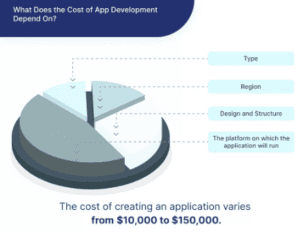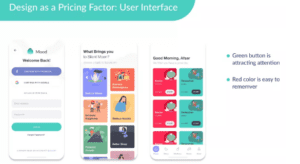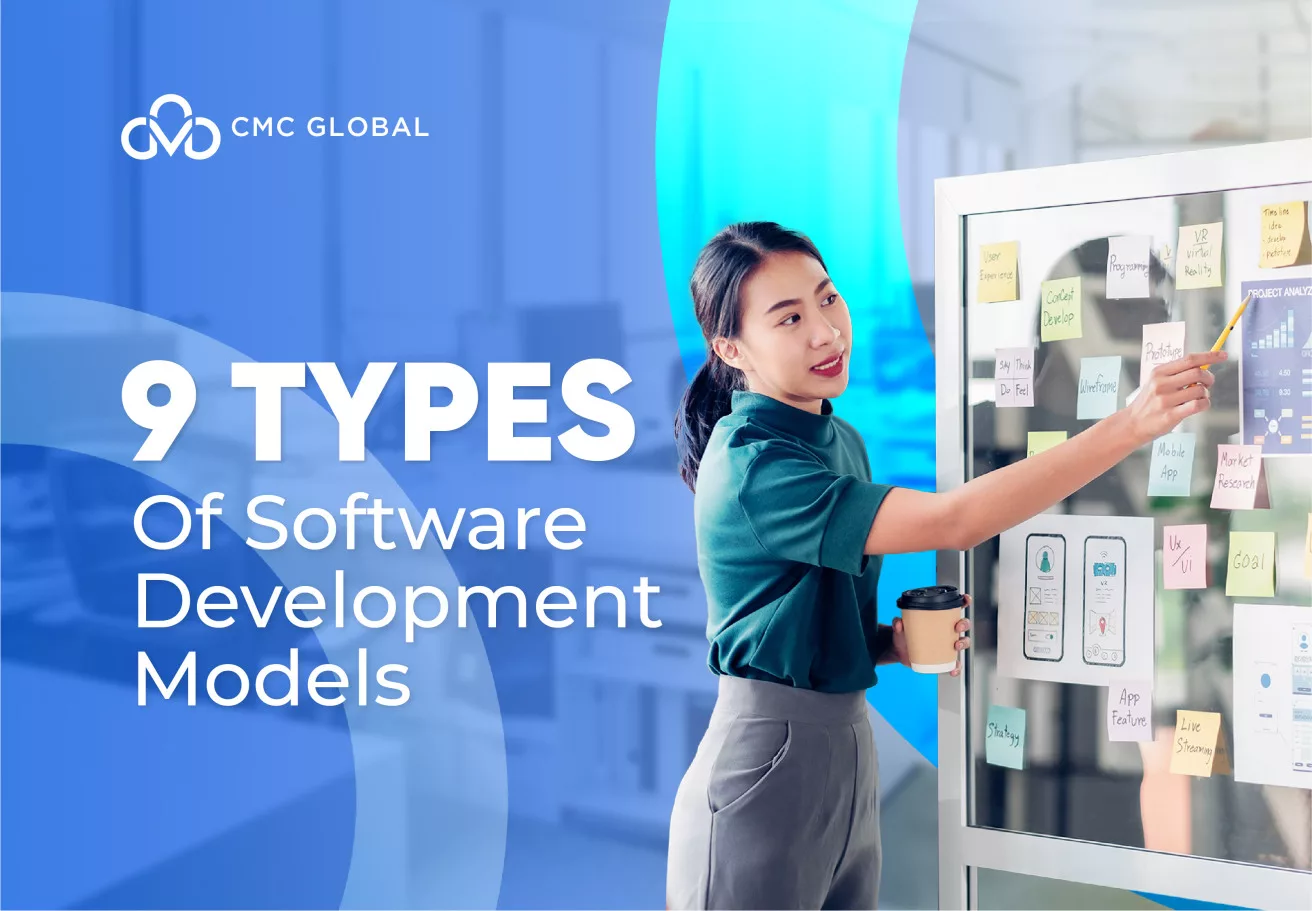The mobile application market is expanding at a remarkable pace. Notably, both the App Store and Google Play have marked their 10th anniversary, and their growth trajectory indicates that it is likely to persist. With over a thousand applications being added to each app store daily, the prospects for future expansion are bright.
A recent report from the company highlights the escalating expenditure on non-gaming applications, emphasizing the potential for lucrative investment in mobile applications. However, before venturing into this lucrative market, it is imperative to establish a well-defined budget for your mobile application.
Creating an application is a significant commitment that requires a substantial investment of both time and money. What factors influence the position of your app within this expense spectrum? Keep reading to find out.
1. How Much Does It Cost To Make An App?
Introduction
Definition of App Development:
One may wonder what app development entails. In essence, it refers to creating applications for use on mobile devices such as smartphones and tablets. While some app development projects involve web-based or desktop versions, most apps are designed for mobile or tablet use. This process involves various features and considerations, which we will delve into in more detail in this article.
Types Of Software Development For Apps: A Comprehensive Overview
Cost of App Development by Type
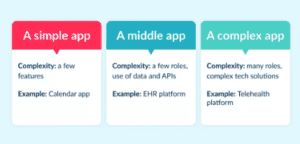
What Does Cost of App Development Depend On:
The expense of app development varies according to the type of application and may range between $30,000 and over $400,000. Considering the application type as a significant determinant of the development cost is crucial.
Here is a list of the most prevalent app types and their respective average development costs.
| App Type | Estimate Cost | Time |
| Mobile App | $30,000-$300,000 | 1,200h |
| iPhone App | $55,000-$300,000 | 1,200h |
| Android App | $50,000-$300,000 | 1,200h |
| Web App | $60,000-$300,000 | 1,200h |
| Startup App | $40,000-$400,000 | 1,600h |
| Taxi App (Uber) | $50,000-$400,000 | 1,600h |
| Game App | $60,000-$250,000 | 1,600h |
| Retail App | $50,000-$150,000 | 1,200h |
| Augmented Reality App (AR) | $100,000-$250,000 | 1,600h |
| eCommerce App | $60,000-$250,000 | 1,600h |
| Social Media App (Instagram) | $50,000-$300,000 | 1,200h |
| Business App | $50,000-$200,000 | 1,200h |
| Education App (DuoLingo) | $60,000-$225,000 | 900h |
| Video Streaming App | $80,000-$300,000 | 1,600h |
| F&B App | $40,000-$150,000 | 900h |
| Social App | $18,000-$150,000 | 900h |
| Shopify App | $30,000-$180,000 | 900h |
| Dating App | $50,000-$350,000 | 1,400h, |
| Delivery App | $40,000-$150,000 | 900h, |
| Hybrid App | $40,000-$200,000 | 1,200h |
| Healthcare App | $55,000-$300,000 | 1,200h |
| Common App | $40,000-$300,000 | 1,200h |
The Categories of Mobile Apps
The classification of the application is a crucial determinant in the average cost of developing a mobile app. Presented below is a list of the three most significant mobile app categories, including their development costs:
| Mobile App Type | Cost |
| iOS app | $75,000-$500,000 |
| Android app | $50,000-$500,000 |
| Hybrid app | $90,000-$700,000 |
In further detail, we will entail below the differences across each type:
IOS App:
An iOS app is a mobile application designed to function primarily on the iPhone operating system and interact seamlessly with the device’s fundamental components.
Such applications are often constructed from Swift, Objective-C, XCode, and similar programming languages.
The cost of developing an iOS app typically ranges from $75,000 to $500,000, depending on the level of complexity and intricacy of the idea being implemented.
Android App Development:
Android apps are designed to function natively on Google’s Android operating system, utilizing the operating system’s components to provide users with the best possible experience.
These applications are typically developed using programming languages such as Kotlin and Java.
Creating an Android mobile application can cost anywhere between $70,000 and $500,000, depending on the level of complexity, compliance laws, and other factors involved.
Hybrid App Development:
A Hybrid app is a mobile application designed to operate efficiently on Android and iOS devices with a single codebase, ensuring optimal performance on both platforms.
Programming languages such as React Native, Ionic, Flutter, NativeScript, and others are commonly used to develop these apps.
The cost of developing a cross-platform mobile app typically ranges from $90,000 to $700,000, depending on the intricacies involved.
In addition to the type of app, the cost of development also varies depending on the country. Let us examine this further.
2. What Determines How Much Software Development Costs?
To develop a mobile app, you must analyze your target audience and business goals, understand app development, and choose a coding platform.
Adding elements to the app like buttons and screens impacts the project budget. Such functionality impacts the app’s cost determinators. So it’s crucial to pre-develop a prototype and plan the functionality carefully.
A few main factors include:
- The application’s complexity
- Design and Structure
- The running platform
Followingly, we will dig deeper into further details of the mentioned three aspects. Let’s first start with the complexity:
Factor 1. App Development’s Complexity
It is essential to carefully consider your feature and integration choices and your development approach to determine the level of complexity.
The development timeline for your app depends on its scale, which includes the number of features, screens, buttons, and functions it will have, as well as the complexity of its business logic. Remember, the smaller and simpler the app, the shorter the development time.
Varying levels of Complexity and it is according to characteristics:
Simple Apps:
– Created with no added benefits,
– Have the basic features
– Low-tech screens, and needed UI solutions
Mid-Level Apps:
– More offered complicated features
– API integrations
– Added screens,
– Customized UI,
– Real-time functions (messages…)
Complex Apps:
– Multi-functional Apps
– Advanced features (real-time synchronization, chatbots, media processing, UI animation, and so on…)
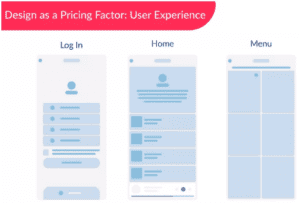
The Three Levels of App Complexity
Factor 2. Design
Continuing with the discussion on the cost of developing an app, it is important to note that the app design stage is a crucial component of the overall development process. The cost of designing an app cannot be considered separately from the cost of developing it, as the two are intertwined
The cost of app design is similar to that of app development, as the addition of more features can result in a proportional increase in cost. Similarly, using templates for design can restrict cost estimates, while more customizations in the design can lead to higher costs and longer development times.
There are a few additional factors that must also be considered during the app design stage:
1. User Experience
The essence of UX (User Experience) lies in ensuring that an application works effectively for its purpose.
This involves creating screen designs on paper or a digital platform with the aim of making the application user-friendly and intuitive for the enduser.
Examples include:
- Button Placement
- Color Psychology
- User’s eye-movement pattern
User Experience
2. User Interface and Visuals
Application design involves a complex set of considerations. However, the process typically begins with User Interface (UI) design, which determines how the application will appear to users.
Designers typically create mockups to provide a visual representation of the application and its features, helping to refine the solution and ensure a successful outcome.
Example include:
- Layout
- Screen
- Colors
- Typography
- Shapes
- Elements
- Items
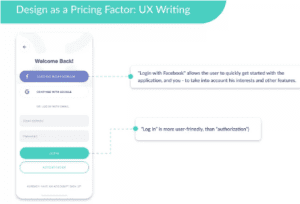
User Interface and Visuals
3. Branding
Branding is a critical element of any business model, as it helps to distinguish an organization from its competitors. Several elements of branding values may include a mascot, color palette, icons…
As such, including branding in the application development process is essential and should not be overlooked.
Examples include:
- Mascot
- Color palette
- Signature
- Icons
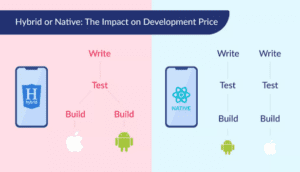
Branding
4. UX Writing
In the process of developing an app for a user, it is important to consider the cost of copywriting. A well-crafted copy can be highly effective in compelling users to engage and interact more with the application. Therefore, the combination of good copy and impactful design is vital to the success of an app.
Examples include:
- Landing Page
- Emails
- Newsletters
Factor 3. Running Platform
While the development process for each platform may differ, the cost of developing an app generally does not vary greatly. Cross-platform applications have the advantage of being easily adaptable to different platforms and can incorporate platform-specific features, leading to a better user experience and potentially lower costs.
In contrast, developing a native app typically involves higher costs due to the need for additional human resources and effort to build two apps for each platform separately. This is due to the requirement of duplicating efforts for each platform, resulting in higher costs.
Hidden Factors
In addition to the more obvious costs associated with functionality, design, and hardware integrations, there are also hidden costs that must be taken into consideration when planning the budget for app development.
- Backend infrastructure and app administration
- Functionalities/per year
- Push notifications: +$2,500 on average
- Chat involvement and socializing integration: +$1,300 on average
- SMS messaging (e.g., Twilio): +$500
- Email marketing: +$1,000 on
- Maintenance
- Bug fixing
- Stabilization and improved performance
- Code optimization
- Updates support
- New features addition
- Third-party services support
3. A Cost Breakdown:
Cost Breakdown Of Each Phase
Creating an app involves various distinct phases, each of which will require a portion of your app development budget. Understanding the most effective practices for allocating your budget throughout each stage of app development can assist in answering the common question: “What is the cost of developing an app?”
The following divided pie chart can suggest to our readers with reference guidelines for future allocations:
Outsourcing Vs. In-House Software Development
The cost-effectiveness of offshore development notwithstanding, employing in-house engineers during the design phase can yield substantial benefits to the product planning process. This approach can lead to time and cost savings, as technical knowledge is integrated into the planning process.
It is important to be cautious of firms that claim to have all their resources onshore, as some may only have their design resources locally and their development resources offshore. This practice enables developers to charge on-shore rates for development and achieve significant profit margins. By conducting appropriate due diligence on team members, such firms can be identified and avoided.
A hybrid approach, whereby competent onshore engineering teams work on the most crucial aspects of a project while cheaper third-party resources handle menial tasks, can be effective. However, this approach is only successful with a genuine onshore engineering team. Relying solely on technical projects or product managers is insufficient.
4. Conclusion
To estimate the cost of developing a mobile app, businesses should consider the complexity of the app. Developing apps for both iOS and Android simultaneously can be a smart strategy due to the high adoption rate of both platforms. Companies can save on development costs by minimizing infrastructure expenses such as data storage, scalability, and third-party API integration.
CMC Global is a top software development firm in Vietnam with numerous benefits, such as employing developers, QAs, and business analysts, as well as developing an appealing package of incentives for your staff members.
With CMC Global, you will never have any difficulties in establishing and operating a development center. Contact us for further consultation.
